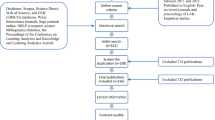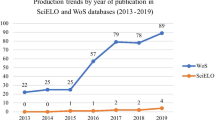Abstract
In this study the authors conducted an empirical, bibliometric analysis of current literature in learning analytics. The authors performed a citation network analysis and found three dominant clusters of research. A qualitative thematic review of publications in these clusters revealed distinct context, goals, and topics. The largest cluster focused on predicting student success and failure, the second largest on using analytics to inform instructional design, and the third on concerns in implementing learning analytics systems. The authors suggest that further collaboration with educational technology researchers and practitioners may be necessary for learning analytics to reach its interdisciplinary goal. The authors also note that learning analytics currently does not often take place in K-12 settings, and that the burden of creating learning interventions still seemed to reside mainly with practitioners.


Similar content being viewed by others
References
Bart, R., Boroowa, A., Cross, S., Kubiak, C., Mayles, K., & Murphy, S. (2016). Analytics4Action evaluation framework: A review of evidence-based learning analytics interventions at the Open University UK. Journal of Interactive Media in Education, 2016(1), 1–11. https://doi.org/10.5334/jime.394.
Borgatti, S., Mehra, A., Brass, D., & Labianca, G. (2009). Network analysis in the social sciences. Science, 323(5916), 892–895. https://doi.org/10.1126/science.1165821.
Boyd, J., Fitzgerald, W., & Beck, R. (2006). Computing core/periphery structures and permutation tests for social relations data. Social Networks, 28(2), 165–178. https://doi.org/10.1016/j.socnet.2005.06.003.
Brandes, U., Delling, D., Gaertler, M., Gorke, R., Hoefer, M., Nikoloski, Z., & Wagner, D. (2008). On modularity clustering. IEEE Transactions on Knowledge and Data Engineering, 20(2), 178–188. https://doi.org/10.1109/TKDE.2007.190689.
Cheng, B., Wang, M., Morch, A., Chen, N., Kinshuk, & Spector, J. (2014). Research on e-learning in the workplace 2000-2012: A bibliometric analysis of the literature. Educational Research Review, 11, 56–72. https://doi.org/10.1016/j.edurev.2014.01.001.
Cho, Y., Park, S., Jun Jo, S., & Suh, S. (2013). The landscape of educational technology viewed from the ETR&D journal. British Journal of Educational Technology, 44(5), 677–694. https://doi.org/10.1111/j.1467-8535.2012.01338.x.
Cooper, H., Hedges, L. V., & Valentine, J. C. (2009). The handbook of research synthesis and meta-analysis 2nd edition. In The Hand. of Res. Synthesis and Meta-Analysis, 2nd Ed. (pp. 1–615). Russell Sage Foundation.
Dawson, S., Gasevic, D., Siemens, G., & Joksimovic, S. (2014) Current state and future trends: a citation network analysis of the learning analytics field. Paper presented at: The sixth international conference on learning analytics & knowledge, Indianapolis, Indiana. New York: ACM. https://doi.org/10.1145/2567574.2567585.
Drachsler, H. & Greller, W., (2016) Privacy and analytics: it’s a DELICATE issue: a checklist for trusted learning analytics. Paper presented at: The sixth international conference on learning analytics & knowledge, Edinburgh, United Kingdom. New York: ACM. https://doi.org/10.1145/2883851.2883893.
Freeman, L., Roeder, D., & Mulholland, R. (1979). Centrality in social network: Ii. Experimental results. Social Networks, 2(2), 119–141. https://doi.org/10.1016/0378-8733(79)90002-9.
Gardner, H. (1987). The mind's new science: A history of the cognitive revolution. Basic books.
Gasevic, D., Kovanovic, V., Joksimovic, S., & Siemens, D. (2014) Where is research on massive open online courses headed? A data analysis of the MOOC Research Initiative. The International Review of Research in Open and Distributed Learning, 15(5), pp. 135-176. https://doi.org/10.19173/irrodl.v15i5.1954.
Gasevic, D., Dawson, S., & Siemens, G. (2015). Let’s not forget: Learning analytics are about learning. TechTrends, 59(1), 64–71. https://doi.org/10.1007/s11528-014-0822-x.
Gasevic, D. [Dragan], Dawson, S., Rogers, T., & Gasevic, D. [Danijela] (2016) Learning analytics should not promote one size fits all: The effects of instructional conditions in predicting academic success. The Internet and Higher Education, 28, pp. 68–84. https://doi.org/10.1016/j.iheduc.2015.10.002.
Gustafsson, H., Hancock, D., & Cote, J. (2014). Describing citation structures in sport burnout literature: A citation network analysis. Psychology of Sport and Exercise, 15(6), 620–626. https://doi.org/10.1016/j.psychsport.2014.07.001.
Kirby, J., Hoadley, C., & Carr-Chellman, A. (2005). Instructional system design and the learning sciences: A citation analysis. ETR&D, 53(1), 37–48.
Kruskal, J. B. (1956). On the shortest spanning subtree of a graph and the traveling salesman problem. Proceedings of the American Mathematical Society, 7(1), 48–48.
Lincoln, Y. S., & Guba, E. G. (1985). Naturalistic inquiry. Thousand Oaks, CA: Sage.
Manyika, J. (2011). Big data: The next frontier for innovation, competition, and productivity. Executive summary, McKinsey Global Institute.
McKenney, S., & Mor, Y. (2015). Supporting teachers in data-informed education design. British Journal of Educational Technology, 46(2), 265–279. https://doi.org/10.1111/bjet.12262.
Miller, G. A. (2003). The cognitive revolution: A historical perspective. Trends in Cognitive Sciences, 7(3), 141–144.
Newman, M. (2006). Modularity and community structure in networks. Proceeding of the National Academy of Sciences of the United States of America, 103(23), 8577–8582. https://doi.org/10.1073/pnas.0601602103.
Núñez, R., Allen, M., Gao, R., Rigoli, C. M., Relaford-Doyle, J., & Semenuks, A. (2019). What happened to cognitive science?. Nature Human Behaviour, 3(8), 782–791. https://doi.org/10.1038/s41562-019-0626-2.
Papamitsiou, Z., & Economides, A. (2014). Learning analytics and educational data mining in practice: A systematic literature review of empirical evidence. Educational Technology & Society, 17(4), 49–64.
Pavlo, D. (2014). The instrumental value of conceptual frameworks in education technology research. Education Tech Research Devlopment, 63, 53–71. https://doi.org/10.1007/s11423-014-9363-4.
Pieters, R., & Baumgartner, H. (2002). Who talks to whom? Intra- and interdisciplinary communication of economics journals. Journals of Economic Literature, 40(2), 483–509. https://doi.org/10.1257/002205102320161348.
Pinker, S. (2003). How the mind works. Penguin UK.
Roberts-Mahoney, H., Means, A., & Garrison, M. J. (2015). Netflixing human capital development: Personalized learning technology in the corporatization of K-12 education. Journal of Education Policy, 31(4), 1–16. https://doi.org/10.1080/02680939.2015.1132774.
Scheffel, M., Drachsler, H., Stoyanov, S., & Specht, M. (2014a). Quality indicators for learning analytics. Journal of Educational Technology & Society, 17(4), 117–132. https://doi.org/10.2307/jeductechsoci.17.4.117.
Scheffel, M., Drachsler, H., Stoyanov, S., & Specht, M. (2014b). Quality indicators for learning analytics. Journal of Educational Technology & Society, 17(4), 117–132.
Sclater, N., Peasgood, A., & Mullan, J. (2016). Learning analytics in higher education. London: Jisc. Accessed February, 8, 2017.
Seimens, G. (2013). Learning analytics: The emergence of a discipline. American Behavioral Scientist, 57(10), 1380–1400. https://doi.org/10.1177/0002764213498851.
Society for Learning Analytics Research. (2019). About SoLAR. Retrieved from https://www.solaresearch.org/about/.
Tight, M. (2008). Higher education research as tribe, territory and / or community: A co-citation analysis. Higher Education, 55(5), 593–605. https://doi.org/10.1007/s10734-007-9077-1.
Toetenel, L., & Rienties, B. (2016). The impact of learning design on student behavior, satisfaction and performance: A cross-institutional comparison across 151 modules. Computers in Human Behavior, 60, 333–341. https://doi.org/10.1016/j.chb.2016.02.074.
Viberg, O., Hatakka, M., Balter, O., & Mavroudi, A. (2018). The current landscape of learning analytics in higher education. Computers in Human Behavior, 89, 98–110. https://doi.org/10.1016/j.chb.2018.07.027.
Wise, A. F. (2014). Designing pedagogical interventions to support student use of learning analytics. Proceedings of the Fourth International Conference on Learning Analytics And Knowledge (pp. 203–211). https://doi.org/10.1145/2567574.2567588.
You, J. (2016). Identifying significant indicators using LMS data to predict course achievement in online learning. The Internet and Higher Education, 29, 23–30. https://doi.org/10.1016/j.iheduc.2015.11.003.
Author information
Authors and Affiliations
Corresponding author
Ethics declarations
This study did not include data from human subjects, and so was given exempt status by the institutional research board at the university of the researchers. This research did not receive any external or internal funding, and the authors do not have any conflicts of interest that need to be reported.
Additional information
Publisher’s Note
Springer Nature remains neutral with regard to jurisdictional claims in published maps and institutional affiliations.
Rights and permissions
About this article
Cite this article
Phillips, T., Ozogul, G. Learning Analytics Research in Relation to Educational Technology: Capturing Learning Analytics Contributions with Bibliometric Analysis. TechTrends 64, 878–886 (2020). https://doi.org/10.1007/s11528-020-00519-y
Published:
Issue Date:
DOI: https://doi.org/10.1007/s11528-020-00519-y




